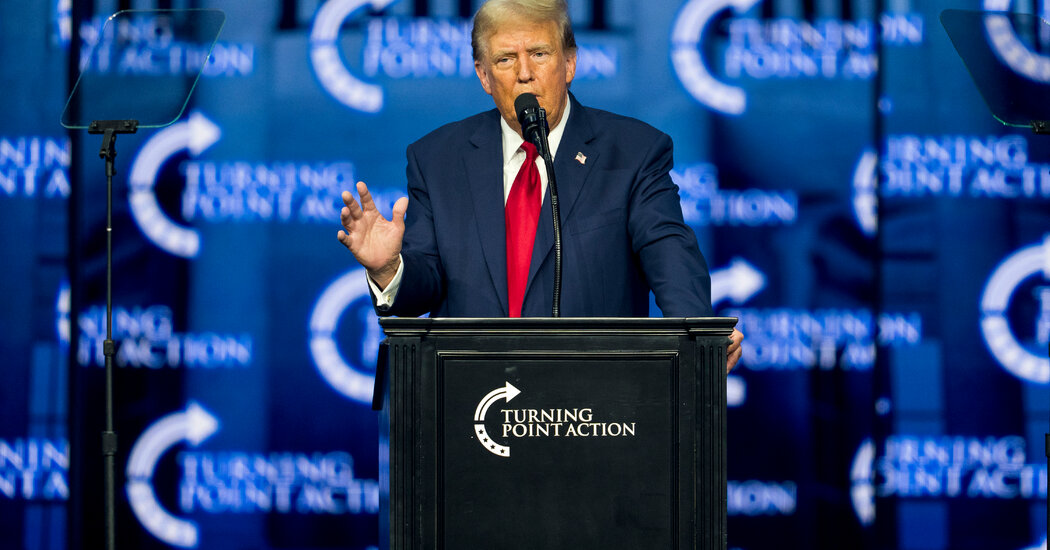When Republicans gather in Milwaukee next month to nominate him for president, Donald J. Trump planned to stay not in the convention’s host city but at a Trump hotel in Chicago, some 90 miles away, according to three people briefed on the former president’s logistics.
That changed midafternoon on Tuesday, after reporters for The New York Times and an ABC station in Chicago contacted his campaign for comment.
Mr. Trump now intends to stay in Milwaukee, two of the people briefed on his logistics said.
Mr. Trump has been on the defensive about his views on Milwaukee since news outlets reported last week that he had called it a “horrible” city in a private meeting with House Republicans in Washington. The change in his convention plans avoids a perceived slight to the largest city in Wisconsin, a vital battleground state.
In a local television interview on Tuesday afternoon, Mr. Trump said he was “always planning on staying” in Milwaukee. “I have a beautiful hotel there, a beauty, as good as it gets,” he said of Chicago. “But I’m staying here.”
And Mr. Trump opened his rally on Tuesday afternoon in Racine by proclaiming his love for Milwaukee, about 30 miles away, which he claimed he selected as the host of the convention. And he repeated his contention that he had only criticized the city over crime and his false claims of voter fraud there in 2020.
“I love Milwaukee. I said we’ve got to fix the crime, we all know that,” Mr. Trump told thousands of people gathered to hear him speak. “You’ve got to make sure the election’s honest.”
The initial decision for Mr. Trump to spend his nights at the Trump International Hotel and Tower in Chicago was made partly because of his own preference and partly because of security and logistics concerns, according to one of the people with knowledge of the Chicago plan. All of the people insisted on anonymity to discuss sensitive planning arrangements.
Mr. Trump has over the years generally preferred to sleep at his own properties while campaigning, and in his 2016 run for president, he sometimes flew hundreds of miles to sleep in his own bed. It also remains possible that Mr. Trump’s plans could change again before the convention starts on July 15.
Alexi Worley, a spokeswoman for the Secret Service, directed questions about Mr. Trump’s lodging to the Republican National Committee. In a statement, she said that the Secret Service would work closely “with law enforcement and public safety partners to adapt security plans as required” to ensure a comprehensive security plan is in place for the convention.
Mr. Trump’s choice to stay in Chicago would have been all but certain to play into Democratic attacks on him.
Garren Randolph, President Biden’s Wisconsin campaign manager, on Tuesday attacked Mr. Trump in a statement that referred to his comments from last week.
“We don’t want him here either — Wisconsinites rejected him four years ago and we will again this November,” Mr. Randolph said.
Over the weekend, the Democratic National Committee put up 10 billboards around Milwaukee to draw attention to Mr. Trump’s remarks. On Saturday, Mr. Trump denied saying Milwaukee was a “horrible city” in a social media post.
“I picked Milwaukee, I know it well. It should therefore lead to my winning Wisconsin,” he wrote. And, he added, “Who would say such a thing with that important State in the balance?”
Judy Gavigan, 63, said at Mr. Trump’s event in Racine that she was unbothered by his comments about Milwaukee, arguing that he had been taken out of context.
“If you watch the local news, if you put that in context, the reality is the crime is bad,” said Ms. Gavigan, who lives in Racine and works at the local chamber of commerce.
Mr. Trump frequently attacks Democratic-led cities as unsafe, even as statistics have shown that violent crime is down across the country after a surge during the height of the coronavirus pandemic.
In a now-standard pitch at the end of his rallies, he promises vaguely to rebuild and improve American cities. “Right now, they’re dead and in squalor,” he said in Racine. “And they’re falling apart.”
Wisconsin is one of several states expected to be crucial in the outcome of this year’s election and has been an intense focus of both the Trump and Biden campaigns. Mr. Trump won the state in 2016 but lost there to Mr. Biden by roughly 20,000 votes in 2020, an outcome fueled in part by suburban Milwaukee voters shifting their support to Mr. Biden.
As Mr. Trump tries to win the state this year, he has made immigration central to his pitch. In Racine, he repeatedly attacked Mr. Biden over his handling of the border, including the policy he announced Tuesday to give legal protections to undocumented immigrants who have been living in the United States illegally for years but are married to American citizens.
“All an illegal alien has to do is sign up for his new program,” Mr. Trump said, describing what he called “sham” marriages in exchange for “amnesty or taxpayer support.”
Mr. Trump again vowed to restore his hard-line border policy and conduct huge deportations if elected. He once more characterized the surge of migrants across the U.S. border with Mexico as an “invasion,” and said of Mr. Biden’s border plans, “We should not be talking amnesty. We should be talking about stopping the invasion instead.”
As he criticized the migrants, describing them broadly as violent criminals or mentally ill people, a group among the crowd of thousands began chanting “Send them back!”
Mr. Trump continues to maintain falsely that voting in Milwaukee, a solidly Democratic city, was rife with fraud, even as a nonpartisan audit found no evidence to support the claim. Still, in Racine, he repeated his false claim that the 2020 election had been rigged and stolen from him.
During his 2020 campaign, Mr. Trump criticized Milwaukee as politically corrupt, citing it as an example of urban decay and violence that he said were out of control, as he appealed for support to white suburbanites.
Mr. Trump has made similar comments about Chicago, where Democrats will host their convention in August. His tower in Chicago, a 92-story skyscraper that opened in 2009, was his last major construction project.
Simon J. Levien contributed reporting from Racine, Wis., and Taylor Robinson from New York.

